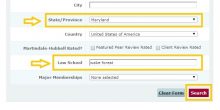The Law Student Holiday Count Down
Posted: December 4th, 2014
At this moment, every successful law school student is hunkered down in preparation for final exams. Library caddies, study rooms, and hallway chairs are all full of studious individuals, hoping to pass their upcoming exams with flying colors. But during this time of year, don’t let those tests consume you. Beyond exams, focus on a series of other strategies that can help you build your professional network and launch your career. At a minimum, look to accomplishing the following five activities the next weeks following exams as a boost to your network and career path:
1. Shortly after exams, invest time sending holiday wishes to every professional and prospective employer you encountered during the previous 12 months. For more casual acquaintances, emailing those wishes can be perfectly appropriate. In the case of a prospective employer, past employer, or alumni of the school, consider sending a holiday card with a brief personal note. Just writing one or two lines will help you become memorable, and being remembered in a positive light is exactly what every student should want.
2. During the winter break, you may return to a city where you worked as a summer associate or intern just a few months ago. Use the upcoming holiday break to reconnect face to face with contacts you established in that city, especially contacts with potential employers. On more than one occasion, a quick coffee or lunch has revealed a previously unknown job opportunity.
3. In addition to meeting with prospective employers, use the winter break to build your professional networks. The holiday season can be the perfect time to reconnect with peers who have gone off in other directions. Search out college classmates who have headed to business school. Eventually and inevitably business people will need lawyers and vice versa. Use this holiday season to start creating those relationships.
4. In many cases, many organizations experience their quietest time of year between Christmas Day and New Years. That means key decision-makers, who have chosen not to take a vacation, have more time than usual to meet with students who have expressed an interest in a particular company or industry. Take a risk this holiday season. Reach out to every prospective employer with whom you have an interest and don’t stop until you’ve scheduled at least one meeting during the holiday break.
5. Spend some focused time during the winter break setting SMART (Specific, Measureable, Attainable, Relevant, Time-limited) goals for the upcoming year. Begin by asking a series of questions, including: Who do you need to know? Who can help you make a connection with a potential key employer? How should you best reach out to that person or persons? When? And what specifically should you say to that individual or ask of them? Remember, you never accomplish a goal that you don’t set.





